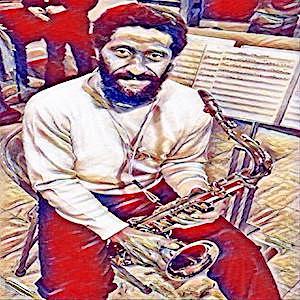

Walter Theodore “Sonny” Rollins is widely recognized as one of the most important and influential jazz musicians of all time. In a seven-decade career, he has recorded over sixty albums as a leader. A number of his compositions, including “St. Thomas”, “Oleo”, “Doxy”, “Pent-Up House”, and “Airegin”, have become jazz standards. Rollins has been called “the greatest living improviser” and the “Saxophone Colossus”.
Sonny Rollins was born on September 7, 1930 in New York City. His parents, immigrants from the U.S. Virgin Islands, raised him in Manhattan’s central Harlem and Sugar Hill neighborhoods. Rollins received his first alto saxophone at seven years old; and was heavily influenced by saxophonist Charlie Parker by the time he enrolled at Edward W. Stitt Junior High School. Rollins switched to tenor saxophone, and was mentored by pianist Thelonious Monk.
Upon graduating from high school, Rollins made his first recordings with Babs Gonzales, J.J. Johnson, Bud Powell, and Fats Navarro. He went on to record with such jazz legends as Miles Davis, the Modern Jazz Quartet, Charlie Parker and Thelonious Monk. In 1954, Rollins’ compositions “Oleo,” “Airegin,” and “Doxy” were featured on Miles Davis’ Bags’ Groove. He later moved to Chicago, Illinois, where he became immersed in the jazz scene at Hyde Park’s Bee Hive club. When Clifford Brown and Max Roach’s band visited Chicago, Rollins was invited to join them, returning to New York City in the summer of 1956. After the tragic deaths of Brown and the band’s pianist, Rollins left the band to lead his own group, recording the acclaimed album Saxophone Colossus, which included Rollins’ calypso-inspired composition “St. Thomas.” In 1957, Rollins pioneered the use of bass and drums, without piano, as accompaniment for saxophone solos, a format later adopted by such band leaders like Lew Tabackin, Branford Marsalis, and Ornette Coleman. In 1958, he recorded Freedom Suite, which received a limited release before being repackaged by Riverside Records.
In 1959, Rollins spent two years practicing yoga and playing saxophone on the Williamsburg Bridge. In 1962, he released The Bridge, which was later inducted into the Grammy Hall of Fame. He also produced five other albums. Rollins experimented with free jazz and noise on East Broadway Run Down, released in 1962. He took another hiatus from 1969 to 1971, travelling to Jamaica and to an ashram in Powai, India. Rollins then began recording more R&B and funk-oriented tracks with Milestone Records, appearing at New York City’s Museum of Modern Art and on The Tonight Show. In 1998, Rollins, a dedicated environmental advocate, released Global Warming.
Rollins recorded over sixty albums, and was the subject of many documentaries. He received numerous awards and honors, including the Grammy Award for lifetime achievement.
This was really a wonderful interview. Who he is really came through. A humble, seeker of truth and his greatness flowed from that. His wisdom and the fruits of his life even beyond music were evident and your questions and approach really brought that out. Thanks!